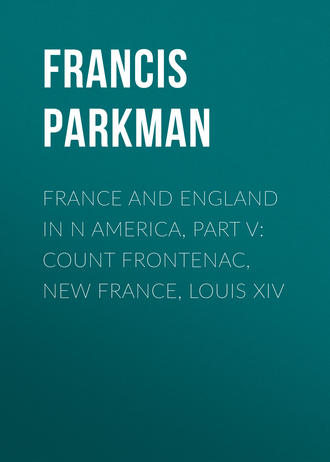 полная версия
полная версияFrance and England in N America, Part V: Count Frontenac, New France, Louis XIV
Discussions now ensued which lasted for days, and now and then became tempestuous. The governor, who had declared that the council had nothing to do with the matter, and that he could not waste time in talking about it, was not always present at the meetings, and it sometimes became necessary to depute one or more of the members to visit him. Auteuil, the attorney-general, having been employed on this unenviable errand, begged the council to dispense him from such duty in future, "by reason," as he says, "of the abuse, ill treatment, and threats which he received from Monsieur the governor, when he last had the honor of being deputed to confer with him, the particulars whereof he begs to be excused from reporting, lest the anger of Monsieur the governor should be kindled against him still more." 45 Frontenac, hearing of this charge, angrily denied it, saying that the attorney-general had slandered and insulted him, and that it was his custom to do so. Auteuil rejoined that the governor had accused him of habitual lying, and told him that he would have his hand cut off. All these charges and countercharges may still be found entered in due form on the old records of the council at Quebec.
It was as usual upon the intendant that the wrath of Frontenac fell most fiercely. He accuses him of creating cabals and intrigues, and causing not only the council, but all the country, to forget the respect due to the representative of his Majesty. Once, when Frontenac was present at the session, a dispute arose about an entry on the record. A draft of it had been made in terms agreeable to the governor, who insisted that the intendant should sign it. Duchesneau replied that he and the clerk would go into the adjoining room, where they could examine it in peace, and put it into a proper form. Frontenac rejoined that he would then have no security that what he had said in the council would be accurately reported. Duchesneau persisted, and was going out with the draft in his hand, when Frontenac planted himself before the door, and told him that he should not leave the council chamber till he had signed the paper. "Then I will get out of the window, or else stay here all day," returned Duchesneau. A lively debate ensued, and the governor at length yielded the point. 46
The imprisonment of Amours was short, but strife did not cease. The disputes in the council were accompanied throughout with other quarrels which were complicated with them, and which were worse than all the rest, since they involved more important matters and covered a wider field. They related to the fur trade, on which hung the very life of the colony. Merchants, traders, and even habitants, were ranged in two contending factions. Of one of these Frontenac was the chief. With him were La Salle and his lieutenant, La Forêt; Du Lhut, the famous leader of coureurs de bois; Boisseau, agent of the farmers of the revenue; Barrois, the governor's secretary; Bizard, lieutenant of his guard; and various others of greater or less influence. On the other side were the members of the council, with Aubert de la Chesnaye, Le Moyne and all his sons, Louis Joliet, Jacques Le Ber, Sorel, Boucher, Varennes, and many more, all supported by the intendant Duchesneau, and also by his fast allies, the ecclesiastics. The faction under the lead of the governor had every advantage, for it was sustained by all the power of his office. Duchesneau was beside himself with rage. He wrote to the court letters full of bitterness, accused Frontenac of illicit trade, denounced his followers, and sent huge bundles of procès-verbaux and attestations to prove his charges.
But if Duchesneau wrote letters, so too did Frontenac; and if the intendant sent proofs, so too did the governor. Upon the unfortunate king and the still more unfortunate minister fell the difficult task of composing the quarrels of their servants, three thousand miles away. They treated Duchesneau without ceremony. Colbert wrote to him: "I have examined all the letters, papers, and memorials that you sent me by the return of the vessels last November, and, though it appears by the letters of M. de Frontenac that his conduct leaves something to be desired, there is assuredly far more to blame in yours than in his. As to what you say concerning his violence, his trade with the Indians, and in general all that you allege against him, the king has written to him his intentions; but since, in the midst of all your complaints, you say many things which are without foundation, or which are no concern of yours, it is difficult to believe that you act in the spirit which the service of the king demands; that is to say, without interest and without passion. If a change does not appear in your conduct before next year, his Majesty will not keep you in your office." 47
At the same time, the king wrote to Frontenac, alluding to the complaints of Duchesneau, and exhorting the governor to live on good terms with him. The general tone of the letter is moderate, but the following significant warning occurs in it: "Although no gentleman in the position in which I have placed you ought to take part in any trade, directly or indirectly, either by himself or any of his servants, I nevertheless now prohibit you absolutely from doing so. Not only abstain from trade, but act in such a manner that nobody can even suspect you of it; and this will be easy, since the truth will readily come to light." 48
Exhortation and warning were vain alike. The first ships which returned that year from Canada brought a series of despatches from the intendant, renewing all his charges more bitterly than before. The minister, out of patience, replied by berating him without mercy. "You may rest assured," he concludes, "that, did it not appear by your later despatches that the letters you have received have begun to make you understand that you have forgotten yourself, it would not have been possible to prevent the king from recalling you." 49
Duchesneau, in return, protests all manner of deference to the governor, but still insists that he sets the royal edicts at naught; protects a host of coureurs de bois who are in league with him; corresponds with Du Lhut, their chief; shares his illegal profits, and causes all the disorders which afflict the colony. "As for me, Monseigneur, I have done every thing within the scope of my office to prevent these evils; but all the pains I have taken have only served to increase the aversion of Monsieur the governor against me, and to bring my ordinances into contempt. This, Monseigneur, is a true account of the disobedience of the coureurs de bois, of which I twice had the honor to speak to Monsieur the governor; and I could not help telling him, with all possible deference, that it was shameful to the colony and to us that the king, our master, of whom the whole world stands in awe, who has just given law to all Europe, and whom all his subjects adore, should have the pain of knowing that, in a country which has received so many marks of his paternal tenderness, his orders are violated and scorned; and a governor and an intendant stand by, with folded arms, content with saying that the evil is past remedy. For having made these representations to him, I drew on myself words so full of contempt and insult that I was forced to leave his room to appease his anger. The next morning I went to him again, and did all I could to have my ordinances executed; but, as Monsieur the governor is interested with many of the coureurs de bois, it is useless to attempt to do any thing. He has gradually made himself master of the trade of Montreal; and, as soon as the Indians arrive, he sets guards in their camp, which would be very well, if these soldiers did their duty and protected the savages from being annoyed and plundered by the French, instead of being employed to discover how many furs they have brought, with a view to future operations. Monsieur the governor then compels the Indians to pay his guards for protecting them; and he has never allowed them to trade with the inhabitants till they had first given him a certain number of packs of beaver skins, which he calls his presents. His guards trade with them openly at the fair, with their bandoleers on their shoulders."
He says, farther, that Frontenac sends up goods to Montreal, and employs persons to trade in his behalf; and that, what with the beaver skins exacted by him and his guards under the name of presents, and those which he and his favorites obtain in trade, only the smaller part of what the Indians bring to market ever reaches the people of the colony. 50
This despatch, and the proofs accompanying it, drew from the king a sharp reproof to Frontenac.
"What has passed in regard to the coureurs de bois is entirely contrary to my orders; and I cannot receive in excuse for it your allegation that it is the intendant who countenances them by the trade he carries on, for I perceive clearly that the fault is your own. As I see that you often turn the orders that I give you against the very object for which they are given, beware not to do so on this occasion. I shall hold you answerable for bringing the disorder of the coureurs de bois to an end throughout Canada; and this you will easily succeed in doing, if you make a proper use of my authority. Take care not to persuade yourself that what I write to you comes from the ill offices of the intendant. It results from what I fully know from every thing which reaches me from Canada, proving but too well what you are doing there. The bishop, the ecclesiastics, the Jesuit fathers, the Supreme Council, and, in a word, everybody, complain of you; but I am willing to believe that you will change your conduct, and act with the moderation necessary for the good of the colony." 51
Colbert wrote in a similar strain; and Frontenac saw that his position was becoming critical. He showed, it is true, no sign of that change of conduct which the king had demanded; but he appealed to his allies at court to use fresh efforts to sustain him. Among the rest, he had a strong friend in the Maréchal de Bellefonds, to whom he wrote, in the character of an abused and much-suffering man: "You exhort me to have patience, and I agree with you that those placed in a position of command cannot have too much. For this reason, I have given examples of it here such as perhaps no governor ever gave before; and I have found no great difficulty in doing so, because I felt myself to be the master. Had I been in a private station, I could not have endured such outrageous insults without dishonor. I have always passed over in silence those directed against me personally; and have never given way to anger, except when attacks were made on the authority of which I have the honor to be the guardian. You could not believe all the annoyances which the intendant tries to put upon me every day, and which, as you advise me, I scorn or disregard. It would require a virtue like yours to turn them to all the good use of which they are capable; yet, great as the virtue is which has enabled you to possess your soul in tranquillity amid all the troubles of the court, I doubt if you could preserve such complete equanimity among the miserable tumults of Canada." 52
Having given the principal charges of Duchesneau against Frontenac, it is time to give those of Frontenac against Duchesneau. The governor says that all the coureurs de bois would be brought to submission but for the intendant and his allies, who protect them, and carry on trade by their means; that the seigniorial house of Duchesneau's partner, La Chesnaye, is the constant resort of these outlaws; and that he and his associates have large storehouses at Montreal, Isle St. Paul, and Rivière du Loup, whence they send goods into the Indian country, in contempt of the king's orders. 53 Frontenac also complains of numberless provocations from the intendant. "It is no fault of mine that I am not on good terms with M. Duchesneau; for I have done every thing I could to that end, being too submissive to your Majesty's commands not to suppress my sharpest indignation the moment your will is known to me. But, Sire, it is not so with him; and his desire to excite new disputes, in the hope of making me appear their principal author, has been so great that the last ships were hardly gone, when, forgetting what your Majesty had enjoined upon us both, he began these dissensions afresh, in spite of all my precautions. If I depart from my usual reserve in regard to him, and make bold to ask justice at the hands of your Majesty for the wrongs and insults I have undergone, it is because nothing but your authority can keep them within bounds. I have never suffered more in my life than when I have been made to appear as a man of violence and a disturber of the officers of justice: for I have always confined myself to what your Majesty has prescribed; that is, to exhorting them to do their duty when I saw that they failed in it. This has drawn upon me, both from them and from M. Duchesneau, such cutting affronts that your Majesty would hardly credit them." 54
In 1681, Seignelay, the son of Colbert, entered upon the charge of the colonies; and both Frontenac and Duchesneau hastened to congratulate him, protest their devotion, and overwhelm him with mutual accusations. The intendant declares that, out of pure zeal for the king's service, he shall tell him every thing. "Disorder," he says, "reigns everywhere; universal confusion prevails throughout every department of business; the pleasure of the king, the orders of the Supreme Council, and my ordinances remain unexecuted; justice is openly violated, and trade is destroyed; violence, upheld by authority, decides every thing; and nothing consoles the people, who groan without daring to complain, but the hope, Monseigneur, that you will have the goodness to condescend to be moved by their misfortunes. No position could be more distressing than mine, since, if I conceal the truth from you, I fail in the obedience I owe the king, and in the fidelity that I vowed so long since to Monseigneur, your father, and which I swear anew at your hands; and if I obey, as I must, his Majesty's orders and yours, I cannot avoid giving offence, since I cannot render you an account of these disorders without informing you that M. de Frontenac's conduct is the sole cause of them." 55
Frontenac had written to Seignelay a few days before: "I have no doubt whatever that M. Duchesneau will, as usual, overwhelm me with fabrications and falsehoods, to cover his own ill conduct. I send proofs to justify myself, so strong and convincing that I do not see that they can leave any doubt; but, since I fear that their great number might fatigue you, I have thought it better to send them to my wife, with a full and exact journal of all that has passed here day by day, in order that she may extract and lay before you the principal portions.
"I send you in person merely the proofs of the conduct of M. Duchesneau, in barricading his house and arming all his servants, and in coming three weeks ago to insult me in my room. You will see thereby to what a pitch of temerity and lawlessness he has transported himself, in order to compel me to use violence against him, with the hope of justifying what he has asserted about my pretended outbreaks of anger." 56
The mutual charges of the two functionaries were much the same; and, so far at least as concerns trade, there can be little doubt that they were well founded on both sides. The strife of the rival factions grew more and more bitter: canes and sticks played an active part in it, and now and then we hear of drawn swords. One is reminded at times of the intestine feuds of some mediæval city, as, for example, in the following incident, which will explain the charge of Frontenac against the intendant of barricading his house and arming his servants:—
On the afternoon of the twentieth of March, a son of Duchesneau, sixteen years old, followed by a servant named Vautier, was strolling along the picket fence which bordered the descent from the Upper to the Lower Town of Quebec. The boy was amusing himself by singing a song, when Frontenac's partisan, Boisseau, with one of the guardsmen, approached, and, as young Duchesneau declares, called him foul names, and said that he would give him and his father a thrashing. The boy replied that he would have nothing to say to a fellow like him, and would beat him if he did not keep quiet; while the servant, Vautier, retorted Boisseau's abuse, and taunted him with low birth and disreputable employments. Boisseau made report to Frontenac, and Frontenac complained to Duchesneau, who sent his son, with Vautier, to give the governor his version of the affair. The bishop, an ally of the intendant, thus relates what followed. On arriving with a party of friends at the château, young Duchesneau was shown into a room in which were the governor and his two secretaries, Barrois and Chasseur. He had no sooner entered than Frontenac seized him by the arm, shook him, struck him, called him abusive names, and tore the sleeve of his jacket. The secretaries interposed, and, failing to quiet the governor, opened the door and let the boy escape. Vautier, meanwhile, had remained in the guard-room, where Boisseau struck at him with his cane; and one of the guardsmen went for a halberd to run him through the body. After this warm reception, young Duchesneau and his servant took refuge in the house of his father. Frontenac demanded their surrender. The intendant, fearing that he would take them by force, for which he is said to have made preparation, barricaded himself and armed his household. The bishop tried to mediate, and after protracted negotiations young Duchesneau was given up, whereupon Frontenac locked him in a chamber of the château, and kept him there a month. 57
The story of Frontenac's violence to the boy is flatly denied by his friends, who charge Duchesneau and his partisans with circulating libels against him, and who say, like Frontenac himself, that the intendant used every means to exasperate him, in order to make material for accusations. 58
The disputes of the rival factions spread through all Canada. The most heinous offence in the eyes of the court with which each charged the other was the carrying of furs to the English settlements; thus defrauding the revenue, and, as the king believed, preparing the ruin of the colony. The intendant farther declared that the governor's party spread among the Indians the report of a pestilence at Montreal, in order to deter them from their yearly visit to the fair, and thus by means of coureurs de bois obtain all their beaver skins at a low price. The report, according to Duchesneau, had no other foundation than the fate of eighteen or twenty Indians, who had lately drunk themselves to death at La Chine. 59
Montreal, in the mean time, was the scene of a sort of by-play, in which the chief actor was the local governor, Perrot. He and Frontenac appear to have found it for their common interest to come to a mutual understanding; and this was perhaps easier on the part of the count, since his quarrel with Duchesneau gave sufficient employment to his natural pugnacity. Perrot was now left to make a reasonable profit from the illicit trade which had once kindled the wrath of his superior; and, the danger of Frontenac's anger being removed, he completely forgot the lessons of his imprisonment.
The intendant ordered Migeon, bailiff of Montreal, to arrest some of Perrot's coureurs de bois. Perrot at once arrested the bailiff, and sent a sergeant and two soldiers to occupy his house, with orders to annoy the family as much as possible. One of them, accordingly, walked to and fro all night in the bed-chamber of Migeon's wife. On another occasion, the bailiff invited two friends to supper: Le Moyne d'Iberville and one Bouthier, agent of a commercial house at Rochelle. The conversation turned on the trade carried on by Perrot. It was overheard and reported to him, upon which he suddenly appeared at the window, struck Bouthier over the head with his cane, then drew his sword, and chased him while he fled for his life. The seminary was near at hand, and the fugitive clambered over the wall. Dollier de Casson dressed him in the hat and cassock of a priest, and in this disguise he escaped. 60 Perrot's avidity sometimes carried him to singular extremities. "He has been seen," says one of his accusers, "filling barrels of brandy with his own hands, and mixing it with water to sell to the Indians. He bartered with one of them his hat, sword, coat, ribbons, shoes, and stockings, and boasted that he had made thirty pistoles by the bargain, while the Indian walked about town equipped as governor." 61
Every ship from Canada brought to the king fresh complaints of Duchesneau against Frontenac, and of Frontenac against Duchesneau; and the king replied with rebukes, exhortations, and threats to both. At first he had shown a disposition to extenuate and excuse the faults of Frontenac, but every year his letters grew sharper. In 1681 he wrote: "Again I urge you to banish from your mind the difficulties which you have yourself devised against the execution of my orders; to act with mildness and moderation towards all the colonists, and divest yourself entirely of the personal animosities which have thus far been almost your sole motive of action. In conclusion, I exhort you once more to profit well by the directions which this letter contains; since, unless you succeed better herein than formerly, I cannot help recalling you from the command which I have intrusted to you." 62
The dispute still went on. The autumn ships from Quebec brought back the usual complaints, and the long-suffering king at length made good his threat. Both Frontenac and Duchesneau received their recall, and they both deserved it. 63
The last official act of the governor, recorded in the register of the council of Quebec, is the formal declaration that his rank in that body is superior to that of the intendant. 64
The key to nearly all these disputes lies in the relations between Frontenac and the Church. The fundamental quarrel was generally covered by superficial issues, and it was rarely that the governor fell out with anybody who was not in league with the bishop and the Jesuits. "Nearly all the disorders in New France," he writes, "spring from the ambition of the ecclesiastics, who want to join to their spiritual authority an absolute power over things temporal, and who persecute all who do not submit entirely to them." He says that the intendant and the councillors are completely under their control, and dare not decide any question against them; that they have spies everywhere, even in his house; that the bishop told him that he could excommunicate even a governor, if he chose; that the missionaries in Indian villages say that they are equals of Onontio, and tell their converts that all will go wrong till the priests have the government of Canada; that directly or indirectly they meddle in all civil affairs; that they trade even with the English of New York; that, what with Jesuits, Sulpitians, the bishop, and the seminary of Quebec, they hold two-thirds of the good lands of Canada; that, in view of the poverty of the country, their revenues are enormous; that, in short, their object is mastery, and that they use all means to compass it. 65 The recall of the governor was a triumph to the ecclesiastics, offset but slightly by the recall of their instrument, the intendant, who had done his work, and whom they needed no longer.
Thus far, we have seen Frontenac on his worst side. We shall see him again under an aspect very different. Nor must it be supposed that the years which had passed since his government began, tempestuous as they appear on the record, were wholly given over to quarrelling. They had their periods of uneventful calm, when the wheels of administration ran as smoothly as could be expected in view of the condition of the colony. In one respect at least, Frontenac had shown a remarkable fitness for his office. Few white men have ever equalled or approached him in the art of dealing with Indians. There seems to have been a sympathetic relation between him and them. He conformed to their ways, borrowed their rhetoric, flattered them on occasion with great address, and yet constantly maintained towards them an attitude of paternal superiority. When they were concerned, his native haughtiness always took a form which commanded respect without exciting anger. He would not address them as brothers, but only as children; and even the Iroquois, arrogant as they were, accepted the new relation. In their eyes Frontenac was by far the greatest of all the "Onontios," or governors of Canada. They admired the prompt and fiery soldier who played with their children, and gave beads and trinkets to their wives; who read their secret thoughts and never feared them, but smiled on them when their hearts were true, or frowned and threatened them when they did amiss. The other tribes, allies of the French, were of the same mind; and their respect for their Great Father seems not to have been permanently impaired by his occasional practice of bullying them for purposes of extortion.







